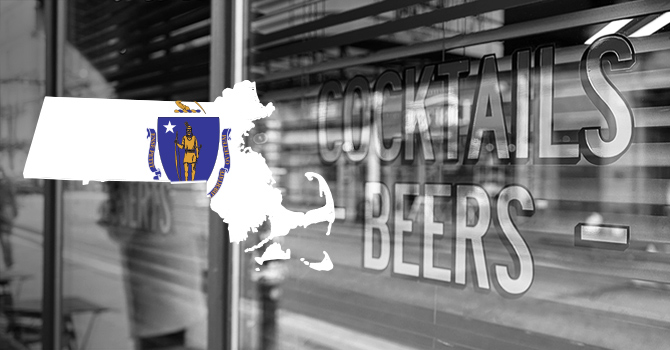
The state of Massachusetts, which temporarily banned on-premise dining and drinking on March 17, has taken a step toward approving to-go sales of beer and wine, something most other northeastern states have had in places since their on-premise bans began.
“We hope our elected officials recognize that time is of the essence and their delays are only hurting an industry that has been besieged by COVID-19,” the Massachusetts Restaurant Association (MRA) wrote in its daily update to members.
The state Senate passed a bill Monday, after receiving it from the House of Representatives on Friday, March 27. Gov. Charlie Baker submitted the bill to the House on March 24 that would allow licensed on-premise businesses to sell beer or wine for off-premise consumption. The bill now awaits Baker’s signature.
“As you know, restaurants and bars are currently barred from allowing customers to eat or drink on-premises, and their liquor licenses limit them to the sale of alcohol for on-premises consumption,” Baker wrote in a letter to the Legislature introducing the bill. “This change would restore a critical source of revenue to restaurants and other food establishments.”
The measure would limit sales to wine and malt beverages sold in sealed containers with a limit of 192 oz. of beer (16 12 oz. beers or 12 16 oz. beers) and 1.5 liters of wine (two standard bottles) per transaction. Wine must be in its original container, but the measure does not make the same stipulation for beer, which opens the opportunity for growler and crowler sales. All sales of alcoholic beverages must be part of a transaction that also includes food. Customers must be 21 years of age or older and all sales are cut off at midnight or the hour the restaurant is licensed to sell until, whichever is earlier.
Lawmakers introduced multiple bills permitting restaurants to sell alcohol to go during the COVID-19 outbreak, including one in the House that would have limited establishments to selling only their current inventory. State Sen. Diana DiZoglio sponsored another version of the bill that allowed to-go sales of beer, wine and spirits throughout the duration of the state of emergency. The version that passed allows for beer and wine to-go sales until the emergency declaration ends.
Governors of other states, such as New York, New Jersey and Connecticut, have enabled on-premise to-go sales through executive orders, but Baker opted to work through the Legislature.
“For local, small restaurants, especially these mom and pop shops who have already had to lay off employees and are worried about potentially shutting their doors forever, this is an emergency,” DiZoglio said. “We need to be doing this and many other things as quickly as possible.”
Ryan Nestor, director of sales for Lynn, Massachusetts-based Bent Water Brewing, said owners of the company’s on-premise accounts have mixed feelings on to-go beer and wine sales. One Boston restaurant owner told him she would not open if the bill passed; others said they were looking forward to it.
“As much as I’d like to sell them beer, I don’t think it’s going to move the needle that much,” Nestor said. “I’d rather see them get rid of existing inventory and make a little bit of money doing that.”
Bent Water’s sales team has been calling accounts to check in and offer support, Nestor added.
“I just want to make sure that these restaurants can sell, literally, cans of Bud Light out of their restaurants — anything helps to stay afloat,” he said. “I’m not looking to use it as a sales opportunity because it’s not.”
As restaurants wait for the legal nod to offer takeout sales, Nestor has counseled accounts on the switch from draft to cans.
“This is a completely different model for these guys,” he said.
Bent Water owns its fleet of 2,000 kegs, which are mostly holed up at shuttered on-premise accounts. Draft lines need to be cleaned every two weeks under normal conditions, according to trade group the Brewers Association’s Draught Beer Quality Manual.
“We’re worried that some of these restaurants are just leaving the beers as-is and they’re just closing the cooler,” Nestor said. “And when Gov. Baker lifts the restaurant ban, they’re just going to start pouring pints and you know there’s nothing worse than an oxidized beer. When it comes down to it, it’s not ABC Restaurant, it’s Bent Water Brewing Company that they’re drinking.”
As with most of the craft beer industry, Bent Water’s on-premise accounts make up about 30% of its volume, and the loss of that has forced the company to lay off two of its eight sales reps. Nestor has been working with the remaining staff to adapt to the moment, even assigning them reading about companies that formed during the Great Depression, such as Johnson and Johnson.
“It’s a whole new way of thinking now and I say to these guys, you need to be creative and you need to innovate and think outside the box and we need to share information,” he said. “The problem is, information is conflicting everywhere, meaning we crushed in the North Shore last week, but Boston was dead.”
Massachusetts’ current emergency declaration dictates that on-premise dining is banned until April 6, but Baker announced last week that the Commonwealth’s schools will be closed until May 6. The MRA expects to have an updated timeline this week.
“We have made clear to the Governor’s office that restaurants will need time and certain steps will need to be completed before being able to re-open,” the organization wrote to members. “Communication to the restaurant industry is important to ensure a smooth transition for everybody coming back on-line.”
This story was updated to clarify that the version of the bill the House passed did not limit sales to restaurants’ current inventory and beer did not need to be sold in its original container.
